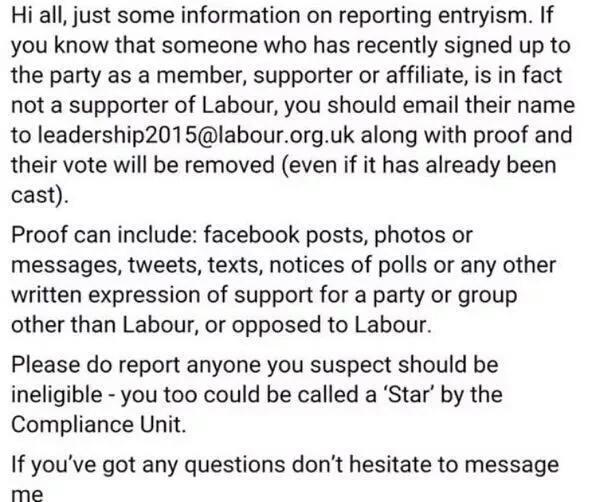Edit: Sorry this is a huge wall of broken quote text. I wrote this and only just realised tbh. I'll try and write a little bit more coherently in future.
Because otherwise you don't have a cabinet and you don't have anyone who will vote with you. I mean, who is Corbyn's cabinet actually going to be?
MPs are a power hungry lot. I don't think filling shadow cabinet positions will be even a slightest problem. Indeed, I don't expect even a single MP to turn an offer down.
I'm unconvinced that's true, and I actually think the divide between "Traditional Conservatives" and "New Tories" is one of the big dividing lines in the Conservative party.
I think there are a bunch of splits there, but I don't think that's really significantly larger than any of the others.
Members who have proved entirely useless at getting anything done. They've had literally decades to change parties the proper way, by going to the local Labour Party constituency meetings that select candidates and having their say there. Trying to put in a massively radical change from the top down is not going to work.
I don't see how this is radical change from the top down... it's radical change from the bottom up, that results in the head being chopped off. Members who are kinda useless and borderline insane are still more effective than no members, as the SNP have proven.
Meanwhile, I wasn't talking about members. I was talking about the people that can actually get policies passed - MPs.
Labour's MPs are it's problem - they're tainted by their involvement in previous governments with the electorate. 75%+ of them are going to have to go in the next ten years if the party ever hopes to get any power back.
Why? He's demonstrated again and again he's willing to shift positions to accomodate as many people as possible. That's not a bad quality in a party as broad as the Labour Party is right now. No other candidate would do that.
As I've said before, the two party narrative is irrevocably dying, and dying quickly. Shifting positions to accommodate probably isn't going to work any more. Look at how the Lib Dems did that, and it's destroyed them.
Anti-establishment parties are gaining ground across Europe precisely because people are sick of hearing shifting, vague answers designed to try and alienate as few people as possible. This is exactly why Burnham is doing so badly - he should have walked this - because he's not laid out any positions to try and keep a broad church.
I'm not saying that. I'm saying that you can't solve two decades of diversion between the party mechanism and the party and expect to resolve it overnight by the election of the most extreme MP in the entire party. This is part of the frustration I have with Corbyn voters - "the entire world must change for me immediately now and no possible other policy will have any effect". That's just not how life works.
At a point of small electoral turnout, it is how elections work. Wild swings are going to become much more common, as they have across Europe. UKIP's entire identity is "we're not them." And while it hasn't translated into seats yet, it has translated into huge numbers of votes that's knackered Labour.
I am actually pretty serious when I say if the Labour Party adopted a position that, if elected, it would take anyone who'd previously served as an MP for any party and have them tarred and feathered they'd win by a general election by a landslide. That's how bad anti-politics has gotten.
Just obviously wrong. Look at the Liberal Party's history. In '51 they were so poor they could only field enough candidates to compete in a quarter of the UK. They're still around after that, and their position isn't as bad as that now anyway.
But... they're not still around. The Liberal Party literally doesn't exist. They were replaced by the Lib Dems, and yes a merger was involved, but ultimately the Liberal Party, as it was, died, and never came back. And we are in a much more rapid period of electoral change and shifting ability for parties to exist than we were in the 50s.
Attlee, Wilson, and Callaghan were all known for the fact that they tended to have closely kept opinions of their own that were only rarely pushed strongly, and instead acted as the central counterweight to all the different factions in their party.
As I've said before, I don't think those are valid in an era of fragmenting public discourse and mass communication, and collapsing voter numbers. The political game is changing a lot and none of those approaches work today.
Yes, I agree. Cooper would be as terrible as Corbyn, if not more so.
I think the interesting thing is why certain bits of the press are so willing to burn their credibility here backing candidates that are poor and they know can't win. Is the Guardian and New Statesman really so blinded now they've literally just done it because their respective editors think gender is the 100% most important thing? How is that supposed to fit with them saying there's no point electing Corbyn because he can't win? I'm honestly confused by it.




